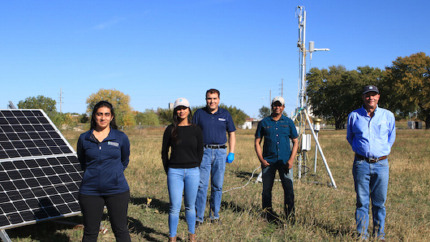
University of Nebraska–Lincoln researchers affiliated with the Daugherty Water for Food Global Institute have received a $3 million grant from the U.S. Department of Energy to better quantify carbon sequestration and greenhouse gas emissions connected with corn production fields in the Midwest.
The high-tech effort is included in the first phase of the Smart Farms program launched by the Energy Department’s Advanced Research Projects Agency-Energy. The data gathered during the three-year project will help inform American farmers to improve their operations and participate in bioenergy and carbon markets expected to develop in coming years.
The Nebraska-led group is one of six tapped by the agency to do careful greenhouse gas measurements in production fields for grain crops that supply the ethanol industry. Corn and soybeans will be the focus of the Nebraska-led project. Other partners with Nebraska are the University of Wisconsin-Platteville; South Dakota State University; the USDA Agricultural Research Services laboratories based in Ames, Iowa, Morris, Minnesota, and Lincoln; the Alliance of Crop, Soil and Environmental Science Societies; and AgriThority, an agricultural science consulting firm based in Kansas City, Missouri.
“Our objective is to measure all greenhouse gases being emitted and also being sequestered at fields in Nebraska, Iowa and Minnesota,” said Christopher Neale, director of research at the Daugherty Water for Food Global Institute and biological systems engineering professor at Nebraska. “Once we establish these careful measurements, we can use these data sets to inform and fine-tune models for different production systems. Our ultimate goal is to establish how much carbon credit a typical farmer creates, based on soil types, production systems, crops and so forth.”

